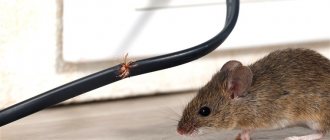Reasons why a rat laughs
As scientists have established, rats (both decorative and wild) are the only animals that, along with humans, are capable of consciously laughing. Researchers associate this feature with a high level of intelligence and socialization of rodents. Most scientists are inclined to believe that the cognitive abilities of rats are superior to those of domestic cats and dogs. Usually little furries laugh for the following reasons:
- tickling – the skin of decorative rats is susceptible to light touches;
- playing with relatives - rats are social animals, so active spending time with their cagemates brings only positive emotions to them;
- family idyll - female rats are considered one of the most caring mothers in the animal world, they are very kind to their little rats, so during periods of special tenderness you can notice a smile on the face of the new mother.
In general, rats, like people, can laugh and smile, experiencing any positive emotions. For example, rodents are known to laugh every time they receive their favorite treat.
The laughter of male rats makes them more attractive to females. It has been established that rat girls choose smiling, cheerful gentlemen for procreation.
Sounds of communication
When expressing feelings and mood vocally, the tonality and nature of the sounds produced by a rodent are diverse. For example, by squealing or chirping, your pet shows that it is scared or feels discomfort. Hissing expresses hostility and aggression. If your pet starts hissing, it is better not to disturb him. He is capable of biting the owner, moreover, this negatively affects the state of his nervous system. The animal will refuse food and may even bite its cage neighbors.
If the little tailed friend is in a good mood, then the new owner, who has previously had no experience in handling decorative rodents, will be able to personally see in practice whether the rats are laughing. Laughter will be an expression of delight and joy from communicating with a person or relatives: characteristic sounds - the pet will squeak or grunt a little.
How to make a rat laugh
A pet's smile undoubtedly evokes the most positive emotions in the owner. So it's no surprise that rodent owners are constantly looking for ways to make their pets laugh. The following actions will help you make a decorative rat laugh:
- The surest way is to tickle the fluffy . You just need to act as carefully as possible so as not to hurt the animal. Each rat has its own most sensitive areas. Therefore, you will first have to “probe” the vulnerable spots. These can be the pads of the paws, belly, sides, area under the neck, withers.
- Give your pet a fun time . The best thing to do is let the rat out of the cage and play with it a little. For example, use your hand as an imaginary opponent, alternately retreat under the onslaught of the rodent and attack, while lightly tickling the “prey”.
- Buy a same-sex companion for your pet . Rats living alone feel very bad. Therefore, it is better to populate a cage with 2-3 individuals at a time. Then the pets will have fun frolicking and playing, making each other laugh. The owner will only have to watch the pets and their smiles.
Each rat has its own individual character. Therefore, you need to watch your pet a little. Some rodents may laugh while walking in the fresh air, others - when listening to certain tunes, and others - when receiving their favorite treat. The main thing is to be attentive and notice under what circumstances the pet’s face breaks into a satisfied smile.
It should be taken into account that in a stressful situation or if there is danger nearby (a cat or a stranger), the rat will not laugh. None of the above methods can make her laugh. This is due to the instinct of self-preservation - as long as the pet feels any threat to its life, it will not have fun.
It is worth noting that the human ear is not able to recognize the laughter of rats. You can tell that your pet is having fun by the contented smile on the animal’s face, as well as by its cheerful squeaking or grunting.
The animal’s ears can also tell about the high spirits and laughter of a decorative rat. The fact is that while laughing, the pet’s blood begins to circulate more actively. As a result, the rat's ears turn red, become limp, and take on a drooping appearance.
Rats laugh much more often than adults. And this is not surprising - like any children, they love to play and frolic.
Do rats like tickling?
But if the origins of human laughter can be traced back to primates, perhaps we might find similar evidence if we go even further down the evolutionary line? Maybe the squeals and whistles that dolphins make during games are somehow related to human laughter?
In the late 1990s, Jaak Panksepp and his colleagues at Washington State University studied the extent to which rodents could exhibit joy. They found that rats produced a 50 kHz sound while playing. This squealing is inaccessible to the human ear, but it can be detected using special equipment. Apparently this is a signal of pleasure.
Scientists decided to go further. Deep brain stimulation has shown that when a rat squeals, the areas of the brain associated with positive emotions become active. Moreover, the researchers tried tickling the rat, and it made the same sounds. When scientists stopped tickling the animal, the rodent was more inclined to play than before. Small children behave in a similar way: you can attract their attention and awaken the desire to play, and then it will be difficult to stop and calm a cheerful and active baby.
What other emotions does a rat have?
Rats are capable of experiencing a whole range of emotions, and each of them corresponds to a separate sound signal. Each owner needs to study the emotional reactions of the pet, this will help to quickly establish a close connection with the animal. Basic emotions of rats:
- Fear - the rat screams heart-rendingly loudly in a chesty voice. In this case, the animal hides in a corner or hides in a house. To calm the animal, you simply need to remove the irritating factor. For example, turn the music down, kick the cat out of the room, remove a new toy from the cage.
- Discomfort or pain – the pet squeals, squeaks, or chatters its teeth. At the same time, the rat becomes quiet, lethargic and apathetic. In such a situation, it is necessary to show the animal to a veterinarian. Most likely the pet is sick.
- Aggression - the rat hisses like a cat, makes wheezing sounds, and chatters its teeth. At the same time, the pet’s fur stands on end, and the fluffy himself takes a warlike pose. At such moments, it is better not to approach the fluffy one or even leave him alone. If there are other rats in the cage, it is better to put them away for a while - the possibility of an attack cannot be ruled out.
- Pleasure, high spirits - the rat grinds its teeth or squeaks quietly. At the same time, the pet clearly demonstrates its readiness to communicate - it sniffs the owner’s hands, approaches the cage door, and flirts with other rats.
- Sympathy for the opposite sex - potential partners make vibrating sounds (like a cat purring). At the same time, the animals actively show mutual interest - they sniff each other, engage in grooming, and play.
Knowing why a rat smiles and laughs, every owner will be able to build a close emotional connection with their pet. After all, small animals feel when the owner is trying to make them laugh or please. A grateful pet, in turn, will definitely respond to the person with sincere love and trust.
Dream Interpretation - Bite
An animal bite in a dream foreshadows a quarrel or resentment. Feeling a bite in a dream means losses and worries. Such a dream often predicts domestic troubles and scandals. If you dream that you were bitten by some person, then do not hope to win in some controversial matter. A dream in which you bit someone foreshadows a serious illness or nervous shock. If you dream that you were bitten by a cat or dog, then be afraid of betrayal or quarrels with a loved one. If in a dream you are bitten by a person whom you knew before, then you will be haunted by difficult memories. See interpretation: Animals, Beasts, Teeth. The mark of teeth left behind after a bite means that the insult inflicted on you will be etched in your memory for a long time. If you see blood at the site of the bite, then you will be very worried about what happened. See interpretation: Blood.
Suggested Explanation
Why this happens is difficult to explain. Their ears are likely starting to droop as the rodents relax, but the change in color is harder to decipher. The ears turn pink because there is an increase in blood flow to them, but whether this is because the animals feel happier or because their bellies are tickled increases physical activity is not yet known.
How rats feel when they “laugh” with their ears is even more difficult to understand. You can't ask that question of rodents. But scientists can scan their brains
Considering that rats' brains are made up of the same connections as our own, including all the same chemicals and functions, it wouldn't be too far-fetched to assume that they feel much the same as we do.
Dream Interpretation - Jump, fly
Jumping down and flying for a long time is a victory as a result of conscious duty. Jumping with a parachute is the courage to oppose misfortune. Flying on straw is a misfortune for yourself. On the grass - get joy from a friend. On the street - separation from my wife. Jumping from a normal height, jumping over any object - everything looks better than it really is, you overestimate your strength. Squatting is a serious illness. Jumping from a low object means slander awaits you. Jumping from transport means success in business. Jumping over an abyss, a crack in the ground - success in business requires you not to think too deeply; happiness from ignorance.
Skin injuries
While playing or walking around the house, it is important for owners to keep an eye on their pet to protect it from fractures and soft tissue injuries. Remember that rodent skin is very sensitive and can be damaged by awkward movements.
If a rat has skinned its tail, treat the surface with a disinfectant and visit a doctor. In some cases, the area needs to be amputated, but with proper and timely treatment, the tissue is restored.
When several animals are in the same cage, it is important for owners to monitor the behavior of their pets so that during play they do not tear off the skin or cause injury to each other. During sleep, the animal may fall, so you should ensure that there are no thorny or dangerous objects
Active animals often receive burns and scratches on their tails and paws. If there is an open wound, it must be treated. If the area of skin that is scraped or damaged is significant, the wood litter should be replaced with a cloth to prevent infection.
Dream Interpretation - White Rat
One of the wonderful animals, sometimes speaking, signifies in a dream unexpected, but dubious (!) enrichment, profit, prosperity, family happiness, based on unseemly affairs and connections, unclean aspirations. Occasionally, it indicates real treasures and represents help in business (or rather, a form of perception in a dream of a future event with a successful but dishonest deal). In general, the white rat is a great success, material success with bad consequences and often a tragic outcome. The energetic influences of the original prophetic plot of the dream, in which the main element was this “wonderful animal,” can be traced using a specific example. After accepting help from a white rat in a dream, one man after some time suddenly became rich in reality, but over time he became addicted to alcohol and eventually became an alcoholic, who eventually lost his family and health.
What makes rats laugh?
The best way to make a rat laugh and admire its fun is to tickle the animal. The animal's reaction to tickling is no different from that of humans. This is the responsibility of neurons that regulate mood, located in both humans and rats in the frontal lobes of the brain.
You can give a small rodent pleasure, and at the same time see his smile and hear the laughter of your beloved pet, by tickling the most sensitive areas of his body:
- tummy;
- the reverse (inner) side of the legs, i.e. feet;
- behind the ears;
- withers (neck).
The animal will enjoy such entertainment and in the process it will definitely begin to smile and squeak fervently, as if laughing. A rat's laughter usually resembles a giggle, but sometimes it sounds more like a light grunt.
Usually, after the first such “procedure,” the animal looks forward to the next session. At every opportunity, he will hope to reach out to the owner's hands, as if exposing his carcass. Of course, this only happens if the animal is in a good mood or if the first experience was successful and did not turn into stress. To avoid the latter, you should not try to tickle your pet when he is busy with something (eating, playing, etc.).
It is worth noting that the animals laugh merrily not only from tickling. The laughter of animals while playing with each other (or even just while watching the antics of their relatives) is a common occurrence. An interesting nuance - when choosing a soul mate, females in most cases give preference to the funniest individuals.
Treatment for pododermatitis includes:
1. Elimination of the causes of the problem (correction of excess weight, soft flooring at the bottom of the cage, timely trimming of claws, walking the animal) 2. Drug treatment: treatment of the affected area with sprays, ointments with anti-inflammatory, wound-healing, drying effects. Applying bandages to the paws with these drugs. A course of injectable antibiotics and, if necessary, a painkiller. 3. Surgical treatment - cleaning wounds, opening abscesses, removing connective tissue growths, cauterizing granulations. In the future, the prognosis after the course is usually cautious; relapses are possible due to the constant load on the feet. If your pet has this problem, contact our clinic. Here they will give you answers to your questions and provide assistance in solving the problem.
Article provided by: Elena Maksimovna Gaiduchik, doctor at the Panda veterinary clinic, specialist in exotic animals
Author: user user | Category: Dermatology, Exotic animals | Tags: clinical signs of subdermatitis, treatment of subdermatitis in rodents, treatment of subdermatitis in rodents in the Dnieper, subdermatitis in rodents
He who is in rat's skin is small, but he is brave
Rats have truly limitless abilities; in particular, they can be excellent laboratory assistants. In Tanzania, these animals detect tuberculosis bacteria. Modern technologies can test no more than 20 saliva samples per day, but rats test 150 samples in a matter of minutes. In the same country, rats search for mines, dynamite, and other explosives.
Photos from open sources
Burmese rats “serve” at customs. They will not let through a single drug courier, not a single drug baggage. A similar practice was adopted in Russia and the USA. have great advantages over dogs, since they instinctively sniff everything around them, and also penetrate into places that are inaccessible to large animals.
Against the background of the development of such technologies, new ambitious projects are born. Thus, Americans have long been thinking about connecting rat brains to implanted microcircuits. The presence of microchips in the brain will allow the operator to control an entire army of rats.
Such universal warriors can be scouts behind enemy lines; they are capable of carrying out various acts of sabotage at weapons, fuel and chemical warehouses, and missile bases. Rats can also plant poison capsules or listening devices in headquarters rooms.
Photos from open sources
What is the best way to reward a rat when training it?
In order for the animal to develop positive associations with performing tricks, it should be rewarded, otherwise it will not do anything. It is worth remembering that raising your voice and physical punishment will not work, but will only embitter the animal and it will no longer trust you.
You can use a variety of treats for rewards. Best suited:
- Boiled chicken pieces
- Boiled rice
- Walnut pieces
- Hulled sunflower or pumpkin seeds
- Cheese
It is also worth highlighting that rats love to have their cheeks stroked, but it is best to use food as a reward.
Australian biologists tickled rats for a month for the sake of science
Scientists from a laboratory in Canberra tickled experimental rats every day for a month to improve their emotional state. Happy animals perform better during experiments. This means they help people, including seriously ill people. In addition, such interaction helps to establish contact. So that everyone can make friends with rats, biologists have released a special online course on how to tickle them correctly.
Tickling imitates the playful struggle of young rats. While stroking, rodents produce ultrasonic vocalizations, writes The New York Times. The louder the rat squeaks, the more it likes what is happening. At the same time, rodents are just like people - not everyone likes tickling.
“There is a right way and a wrong way to tickle a rat. If you do it wrong, at best the rat will not understand you, and at worst, you will harm it,” said laboratory animal specialist Carly Mottley.
How to tickle a rat correctly
- Touch the back of the rat's neck with a quick, light motion. Stroke the animal's back. Do not touch the tail and buttocks. The aggression of relatives is usually directed at these parts of the body, and the rat may become frightened.
- Gently grab the rat around its front legs, lift it up, and use your wrist to turn it onto its back.
- Tickle the rat's chest and the space between its front legs, constantly pressing it to the surface and leaving no chance to roll over. This interaction accurately imitates playful wrestling and allows the rodent to get maximum pleasure.









